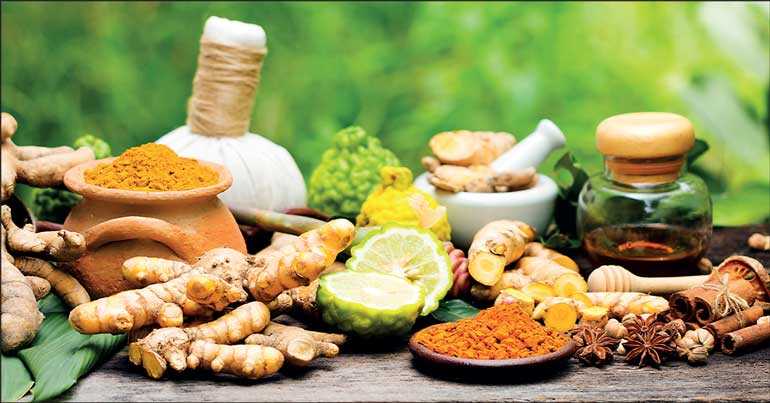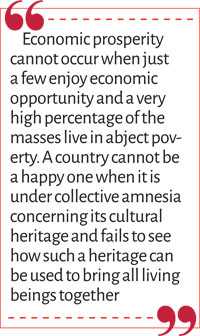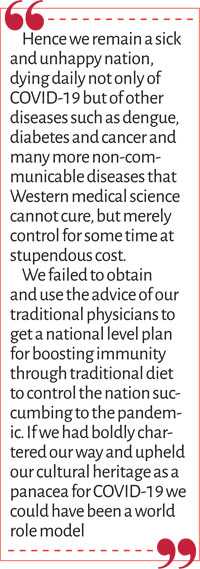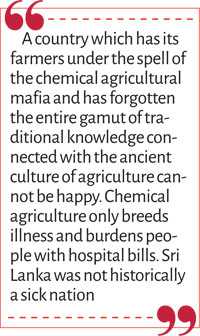Saturday Feb 21, 2026
Saturday Feb 21, 2026
Saturday, 24 April 2021 00:05 - - {{hitsCtrl.values.hits}}

Sri Lanka possesses one of the most ancient medical systems that pre-dates Ayurveda – namely Deshiya Chikitsa or Sinhala Wedakama. If Sri Lanka had boldly used this medical science for controlling the pandemic, maximising both the curative and preventive knowledge enshrined within our herbs and traditional diet, we could have changed the happiness levels of our nation within last year
By Surya Vishwa
 Last month the latest World Happiness Report was released in the existing COVID-19 backdrop and especially focuses on the structure and quality of COVID-19 on the lives of people.
Last month the latest World Happiness Report was released in the existing COVID-19 backdrop and especially focuses on the structure and quality of COVID-19 on the lives of people.
The World Happiness Report is an initiative begun in 2011 in Thimpu following the Bhutanese Resolution passed by the General Assembly in June 2011. This resolution paved the way to requesting the world to give more credence to happiness and wellbeing in determining how to achieve and measure social and economic development.
Bhutan as a Buddhist majority country used its Buddhist cultural heritage in an exemplary manner by internationally publicising the philosophy that governs it, which gives pride of place to Gross National Happiness (GNP). Thereby Bhutan became the first country in the world to boldly assert, based on a truth that is present within the Buddhist philosophy, that happiness is not about material wealth.
Thus it gave a fresh lease of hope to countries such as Sri Lanka and to all nations, especially some nations which have pursued an over industrialised model of development, obsessed by materialistic over-consumption at great cost to Mother Nature, to look at alternative routes of measuring human wellbeing.
The website providing details on the World Happiness Report explains that so far eight happiness reports have been produced following the United Nations meeting on ‘Well-Being and Happiness: Defining a New Economic Paradigm’ held at the UN on 2 April 2012. The aim of the report is to evaluate the science of happiness and the level to which happiness exists among the people in different countries.
The latest World Happiness Report which was released on 20 March, the International Day of Happiness, has ranked 156 countries by happiness levels, based on aspects such as life expectancy, social support, and corruption.
Finland, a small Northern European nation has for the second time in a row been named as the happiest country in the world. Denmark, Switzerland, Iceland and Netherlands jostled at the top being within the top five happiest countries. The measurement of happiness is determined in the report by factors that include GDP per capita, social support, healthy life expectancy, freedom to make life choices and generosity.
 Sri Lanka’s low ranking should be a worrying factor
Sri Lanka’s low ranking should be a worrying factor
A careful analysis will show that almost all these aspects fit perfectly with the Buddhist doctrine of loving kindness and with the cultural heritage of Sri Lanka that governed the values of this nation prior to colonisation. Hence Sri Lanka’s low ranking, at the 129th level should be a worrying factor for us. Sri Lanka despite its vast natural resources and human diversity is a country that has been classified as poor and known for wastage, corruption and ethnic-based unrest. The nation has also been wrecked by a 30-year bloody saga unleashed by terrorism and complicated further by diverse international interferences. A population of a country cannot be happy when events such as these happen.
Economic prosperity cannot occur when just a few enjoy economic opportunity and a very high percentage of the masses live in abject poverty. A country cannot be a happy one when it is under collective amnesia concerning its cultural heritage and fails to see how such a heritage can be used to bring all living beings together.
A country which has its farmers under the spell of the chemical agricultural mafia and has forgotten the entire gamut of traditional knowledge connected with the ancient culture of agriculture cannot be happy. Chemical agriculture only breeds illness and burdens people with hospital bills. Sri Lanka was not historically a sick nation.
Hence we should contemplate and re-think how the concept of happiness is connected to every sphere of life and values of a people and country.
The decision to write about this theme was prompted by a comment in a recent conversation with a now retired former military officer of Sri Lanka. Now working for a private company and based in the east of the country he lamented how he has to cope with regular incidents where people come to him saying ‘Major, I have drunk poison and now I am going to die.’ This writer was promised more information of a village in the east which has one of the highest suicide rates in the country and this will be featured and analysed in a separate article later. 
However, what is focused on now is to what level we can give meaning to the Buddhistic philosophy of this nation by ensuring that we build up the happiness of our people by strengthening humanistic values. If we are following the Buddhist values, we cannot be happy when our fellow beings are dying or living traumatised and unhealthy lives. We cannot be happy when trees or animals are killed or abused. We cannot be happy if corruption is linked to political systems.
These humanistic values begin in school and are given shape in institutions such as the parliament. Countries such as Finland and Sweden, are ranked 1st and 7th respectively in the 2021 World Happiness Report. Finland is a small country that has refused to follow a mechanised exam dominated model of education but rather gives prominence to time students spend in nature and encourages nature based experiential learning, keeping in line with its nature dominated heritage. It also minimises exam driven knowledge gathering that encourages rote learning and creates suicide amongst students, a scenario evident in Sri Lanka.
Meanwhile, Sweden’s happiness, probably lies in the fact that it has stringent rules to ensure that those who enter parliament do so not to make money but to genuinely serve people, and provides no luxuries such as personal vehicles or secretaries or related perks to its politicians. Swedish politicians take the bus and train like every other citizen. The salary of a politician is modest, ensuring only the humanistic and people centric persons join. Abuse of power and corruption is very low in this country. Hence the population, happy and confident about its rulers spends its time fruitfully.
Sweden is a country that like Finland has an impressive legacy of innovative education. These countries design their education systems to cater to the happiness and prosperity of their nation. The lifestyle of most persons in these countries although classified as rich, are simple; for example there is no craze to outdo one’s neighbour by purchasing super luxury cars.
Yet these are not Buddhist countries. These are Christian countries. This can teach us not to be harsh to judge people and nations based on their religious labels but recognise the Buddhistic in these values. We can use the above examples to contemplate on how Sri Lanka can regain its original honest and simplicity-based values entrenched in our culture which was seriously de-stabilised by over four centuries of colonisation. We can contemplate how we could think about replicating our ancient Gurukula education model that was common to ancient Sri Lanka where knowledge gathering was a holistic respectful process.
A key point to take into account is that the latest World Happiness Report was prepared in the backdrop of the world being under the onslaught of the COVID-19 virus. The report gives priority to trying to understand how this pandemic impacted the mental wellbeing of the world.
The stressing of the impact of the COVID-19 pandemic on happiness in the 2021 Happiness Report, raises a serious consideration for the world – to look at the heritage of traditional knowledge that is available historically the world over and includes many forms of traditional medical systems that cannot surface to limelight because of the Western science dominated monopoly of allopathy.
 Humanistic and nature-driven models of wellbeing
Humanistic and nature-driven models of wellbeing
Although rampant industrialisation and commercialisation has killed such knowledge, health related intangible cultural heritage encompasses the spiritual and the curative. This is often conjoined in the traditional interpretation of medical healing. Before the era of modernity, technology and industrialisation where curing another became a profit-making medical ‘industry’ alongside poisonous chemical agriculture becoming a food ‘industry,’ ancient civilisations such as Sri Lanka placed the highest level of emphasis on humanistic and nature-driven models of wellbeing.
Sri Lanka possesses one of the most ancient medical systems that pre-dates Ayurveda – namely Deshiya Chikitsa or Sinhala Wedakama. If Sri Lanka had boldly used this medical science for controlling the pandemic, maximising both the curative and preventive knowledge enshrined within our herbs and traditional diet, we could have changed the happiness levels of our nation within last year. This knowledge is held by around at least 20,000 traditional physicians of the country. If given the due respect and utilised the knowledge and skills of these persons, we could have been exporting our medications to the world and not purchasing solutions to the pandemic at enormous cost, spending money we don’t have. We could have stopped the vast amount of joblessness the pandemic has created in Sri Lanka and thus stemmed the levels of unhappiness within the country.
Although their efforts were unrecognised and non-supported, around at least 30 to 40 traditional Lankan physicians have since 2020 March, actively researched how ancient ‘wattoru’ could be used to cure respiratory ailments as well as related complications such as fever, etc., that mark the early symptoms of COVID-19.
Sri Lanka failed to honour and support these physicians who are now independently exporting their medications to many developed countries of the West. In Sri Lanka these physicians had to run from pillar to post to get their medications recognised in addition to being ridiculed by the media. At most, in some instances, they received permission only to market these medications as food supplements.
Hence we remain a sick and unhappy nation, dying daily not only of COVID-19 but of other diseases such as dengue, diabetes and cancer and many more non-communicable diseases that Western medical science cannot cure, but merely control for some time at stupendous cost.
We failed to obtain and use the advice of our traditional physicians to get a national level plan for boosting immunity through traditional diet to control the nation succumbing to the pandemic. If we had boldly chartered our way and upheld our cultural heritage as a panacea for COVID-19 we could have been a world role model.
The World Happiness Report categorises COVID-19 as one of the serious current causes of world misery. With the world pre-occupied with Western science for solving the current pandemic, if we had de-colonised our minds and chartered our own path using the knowledge of our ancestors, we could have been in a different global position than we are in now. For Sri Lankans who look at Western medicine as the only solution for all health challenges, it should be noted that apart from a vaccine that has to be injected every six months at an exorbitant cost to the nation, Western science has no other solution for COVID-19. Western science has no immunity boosting methods that Sri Lanka’s traditional medicine has.
Good health is centric to happiness of a person or country and every single dimension of nation-building from education to industry is connected with this factor. As we evaluate our sorry state in the current happiness ranking of the world we may realise the level that we have contributed to this unhappiness by our lack of wisdom, awareness, vision and hindsight.